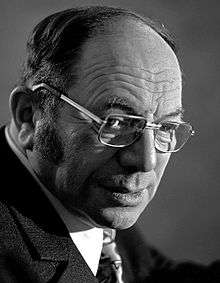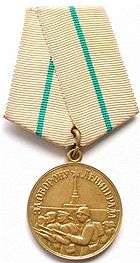Leonid Kantorovich
| Leonid Kantorovich | |
|---|---|
 Leonid Kantorovich in 1975 | |
| Born |
19 January 1912 Saint Petersburg, Russian Empire |
| Died |
7 April 1986 (aged 74) Moscow, Russia, USSR |
| Resting place | Novodevichy Cemetery, Moscow |
| Nationality | Soviet |
| Alma mater | Leningrad State University |
| Known for |
Linear programming Kantorovich theorem normed vector lattice (Kantorovich space) Kantorovich metric Kantorovich inequality approximation theory iterative methods functional analysis numerical analysis scientific computing |
| Awards | Sveriges Riksbank Prize in Economic Sciences in Memory of Alfred Nobel (1975) |
| Scientific career | |
| Fields | Mathematics |
| Doctoral advisor |
Grigorii Fichtenholz Vladimir Smirnov |
| Doctoral students | Svetlozar Rachev |
| Academic career | |
| Information at IDEAS / RePEc | |
Leonid Vitaliyevich Kantorovich (Russian: Леони́д Вита́льевич Канторо́вич, IPA: [lʲɪɐˈnʲit vʲɪˈtalʲɪvʲɪtɕ kəntɐˈrovʲɪtɕ] (![]()
Biography
Kantorovich was born on 19 January 1912, to a Russian Jewish family.[1] His father was a doctor practicing in Saint Petersburg.[2] In 1926, at the age of fourteen, he began his studies at the Leningrad University. He graduated from the Faculty of Mathematics in 1930, and began his graduate studies. In 1934, at the age of 22 years, he became a full professor.
Later, Kantorovich worked for the Soviet government. He was given the task of optimizing production in a plywood industry. He came up with the mathematical technique now known as linear programming in 1939, some years before it was advanced by George Dantzig. He authored several books including The Mathematical Method of Production Planning and Organization (Russian original 1939), The Best Uses of Economic Resources (Russian original 1959), and, with Vladimir Ivanovich Krylov, Approximate methods of higher analysis (Russian original 1936).[3] For his work, Kantorovich was awarded the Stalin Prize in 1949.
After 1939, he became the professor of Military engineering-technical university. During the Siege of Leningrad, Kantorovich was the professor of VITU of Navy and in charge of safety on the Road of Life. He calculated the optimal distance between cars on ice, depending on thickness of ice and temperature of the air. In December 1941 and January 1942, Kantorovich personally walked between cars driving on the ice of Lake Ladoga, on the Road of Life, to ensure the cars did not sink. However, many cars with food for survivors of the siege were destroyed by the German air-bombings. In 1948 Kantorovich was assigned to the atomic project of the USSR. For his feat and courage Kantorovich was awarded the Order of the Patriotic War, and was decorated with the medal For Defense of Leningrad.

After 1960, Kantorovich lived and worked in Novosibirsk, where he created and took charge of the Department of Computational Mathematics in Novosibirsk State University.[4]
The Nobel Memorial Prize, which he shared with Tjalling Koopmans, was given "for their contributions to the theory of optimum allocation of resources."
Mathematics
In mathematical analysis, Kantorovich had important results in functional analysis, approximation theory, and operator theory.
In particular, Kantorovich formulated fundamental results in the theory of normed vector lattices, which are called "K-spaces" in his honor.
Kantorovich showed that functional analysis could be used in the analysis of iterative methods, obtaining the Kantorovich inequalities on the convergence rate of the gradient method and of Newton's method (see the Kantorovich theorem).
Kantorovich considered infinite-dimensional optimization problems, such as the Kantorovich-Monge problem in transportation theory. His analysis proposed the Kantorovich metric, which is used in probability theory, in the theory of the weak convergence of probability measures.
.jpg) Portrait by Petrov-Vodkin. 1938.
Portrait by Petrov-Vodkin. 1938. 1976
1976 Original CIA file on Kantorovich, seized from the former US Embassy in Tehran.
Original CIA file on Kantorovich, seized from the former US Embassy in Tehran.
See also
References
- Makarov, V. (1987). "Kantorovich, Leonid Vitaliyevich". The New Palgrave: A Dictionary of Economics. 3: 14–15.
- Kantorovich, L.V. (1939). "Mathematical Methods of Organizing and Planning Production". Management Science. 6 (4): 366–422. JSTOR 2627082.
- Kantorovich, L.V. (1959). "The Best Use of Economic Resources"(

- Klaus Hagendorf (2008). Spreadsheet presenting all examples of Kantorovich, 1939 with the OpenOffice.org Calc Solver as well as the lp_solver.
- Nobel prize lecture
- Kantorovich, Leonid, "Mathematics in Economics: Achievements, Difficulties, Perspectives", Nobel Prize lecture, December 11, 1975
- "Autobiography: Leonid Kantorovich", Nobel Prize website
Further reading
- Dantzig, George, Linear programming and extensions. Princeton University Press and the RAND Corporation, 1963. Cf. p.22 for the work of Kantorovich.
- Isbell, J.R.; Marlow, W.H., "On an Industrial Programming Problem of Kantorovich", Management Science, Vol. 8, No. 1 (Oct., 1961), pp. 13–17
- Kantorovich, L. V. "My journey in science (supposed report to the Moscow Mathematical Society)" [expanding Russian Math. Surveys 42 (1987), no. 2, pp. 233–270]. pp. 8–45. MR 0898626.
- Koopmans, Tjalling C., "Concepts of optimality and their uses", Nobel Memorial Lecture, December 11, 1975
- Kutateladze, S.S., "The World Line of Kantorovich", Notices of the ISMS, International Society for Mathematical Sciences, Osaka, Japan, January 2007
- Kutateladze, S.S., "Kantorovich's Phenomenon", Siberian Math. J. (Сибирский мат. журн.), 2007, V. 48, No. 1, 3–4, November 29, 2006.
- Kutateladze, S.S., "Mathematics and Economics of Kantorovich"
- Leifman, Lev J., ed. (1990). Functional analysis, optimization, and mathematical economics: A collection of papers dedicated to the memory of Leonid Vitalʹevich Kantorovich. New York: The Clarendon Press, Oxford University Press. pp. xvi+341. ISBN 0-19-505729-5. MR 1082562.
- Makarov, V. L. [Valeriĭ Leonidovich]; Sobolev, S. L. "Academician L. V. Kantorovich (19 January 1912 to 7 April 1986)". pp. 1–7. MR 1082564. Missing or empty
|title=(help) - Polyak, B. T. (2002). "History of mathematical programming in the USSR: Analyzing the phenomenon (Chapter 3 The pioneer: L. V. Kantorovich, 1912–1986, pp. 405–407)". Mathematical Programming. Series B. 91 (3). pp. 401–416. doi:10.1007/s101070100258. MR 1888984.
- Spufford, Francis (2010). Red plenty. London: Faber.
- (in Russian) Vershik, Anatoly, et al., "Leonid V. Kantorovich (1912–1986)", Sobolev Institute of Mathematics of the Siberian Division of the Russian Academy of Sciences. Also published in the Siberian Mathematical Journal, Volume 43 (2002), No. 1, pp. 3–8
- (in Russian) Vershik, Anatoly, "On Leonid Kantorovich and linear programming"
Notes
- ↑ The Soviet Union: empire, nation, and system, By Aron Kat︠s︡enelinboĭgen, page 406, Transaction Publishers, 1990
- ↑ Gass, Saul I.; Rosenhead, J. (2011). "Leonid Vital'evich Kantorovich". Profiles in Operations Research. International Series in Operations Research & Management Science. 147. p. 157. doi:10.1007/978-1-4419-6281-2_10. ISBN 978-1-4419-6280-5.
- ↑ Kaplan, W. (1960). "Review of Approximate methods of higher analysis by L. V. Kantorovich and V. I. Krylov". Bull. Amer. Math. Soc. 66 (3): 146–147. doi:10.1090/S0002-9904-1960-10408-9.
- ↑ Kantorovich`s biography in Russian
External links
| Wikiquote has quotations related to: Leonid Kantorovich |
- O'Connor, John J.; Robertson, Edmund F., "Leonid Kantorovich", MacTutor History of Mathematics archive, University of St Andrews . (With additional photos.)
- Leonid Kantorovich at the Mathematics Genealogy Project
- Information about: Leonid Vitaliyevich Kantorovich – IDEAS/RePEc
- Leonid Vitalievich Kantorovich (1912–1986). The Concise Encyclopedia of Economics. Library of Economics and Liberty (2nd ed.). Liberty Fund. 2008.
- Biography Leonid Kantorovich from the Institute for Operations Research and the Management Sciences
| Awards | ||
|---|---|---|
| Preceded by Gunnar Myrdal Friedrich August von Hayek |
Laureate of the Nobel Memorial Prize in Economics 1975 Served alongside: Tjalling C. Koopmans |
Succeeded by Milton Friedman |
